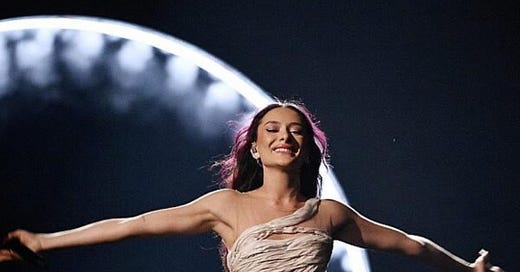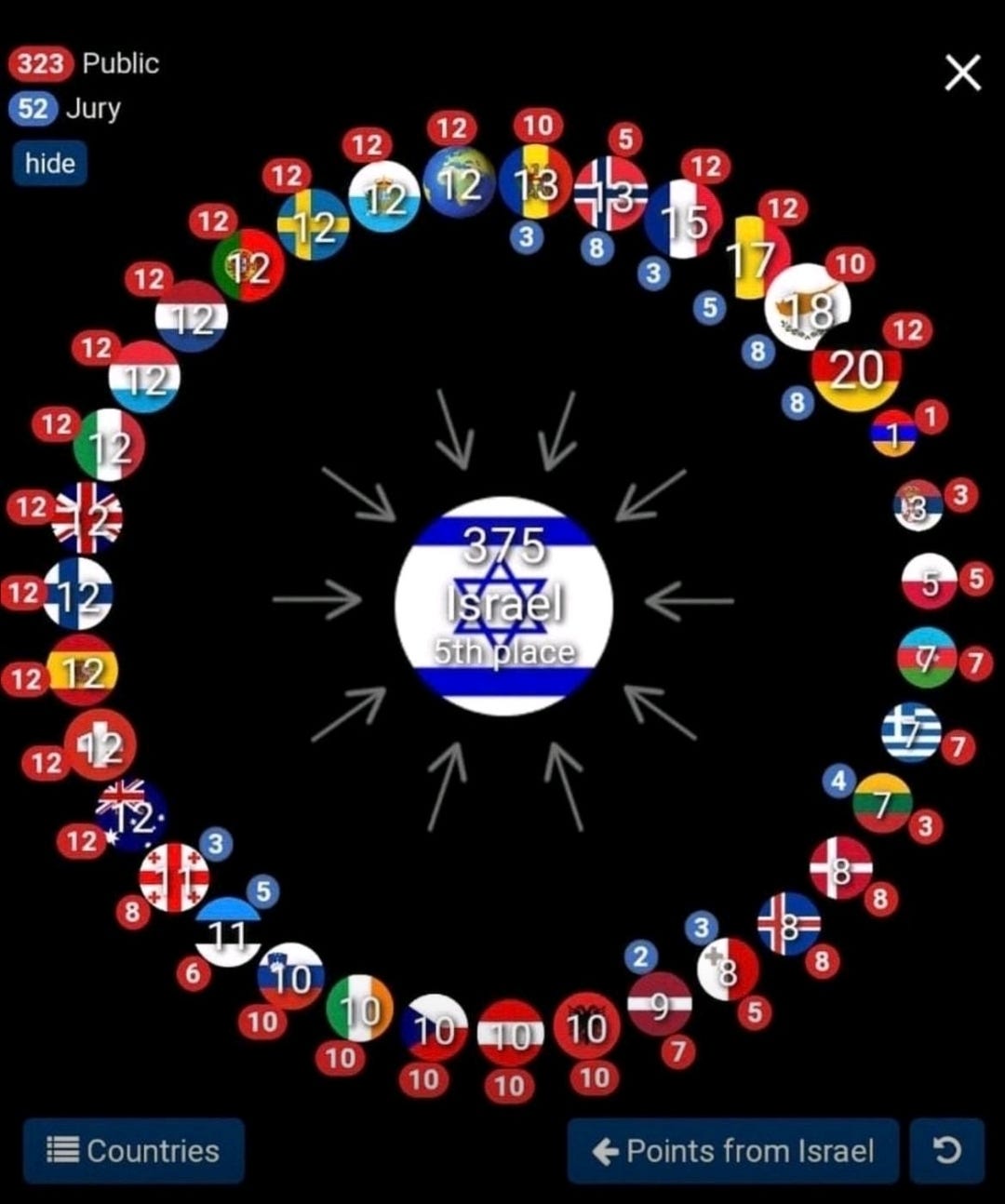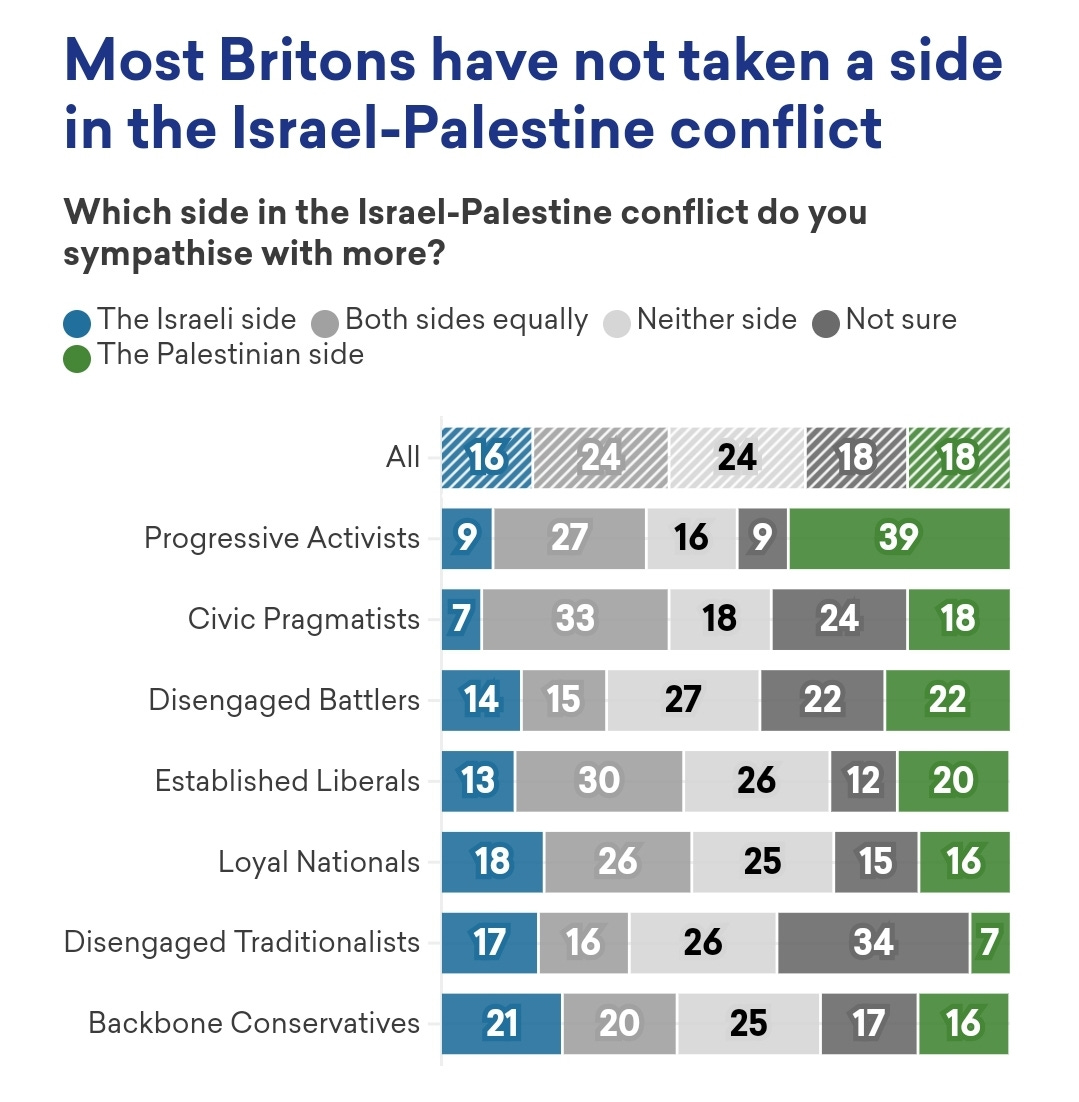The gap between the people of Europe and its tone-deaf elite class has never been so gaping. Brexit was the warning bell. Eurovision was the cacophony. In this annual Europe-wide festival of democracy, the voting public showed the cultural ruling class was they really thought. And the results must have been of great discomfort to your average Guardian reader.
Queers for Palestine. Europeans for gay rights. The gaping gap between the people and their cultural masters.
Whilst 52 la-la land jury votes were cast for Eden Golan’s entry, an overwhelming 323 votes were cast by the European public, placing Israel in 2nd place among European electors. Not a single national jury - in full glare of their dinner party attending friends - dared to give Golan’s song douze points, whereas 15 national electorates, including those of European super powers Germany, France and the UK, placed Israel in first place. Indeed the elite’s chosen winner of Switzerland - who received the winning points from 22 countries - only won the popular vote in one country: Ukraine. With Switzerland falling to 5th place among those in participating public, Nemo’s victory can be best described as a triumph for the favourite act of Richmond-Upon-Thames.
Now I’m going to make a confession. I didn’t watch Eurovision. I haven’t heard any of the songs. And thus I am not in a position to comment on which artist sung the best song or performed the best dance. Who knows: perhaps artistically the UK was robbed? Or perhaps not. But this essay is not about music. For what this contest tells us above all things is that we are not “united by music”. If we were then a 20 year old girl wouldn’t be hounded by protesters, media commentators and print journalists for being of a particular nationality; Brexit would play no part in support for Britain; and the sexuality of a performer would not be used to judge the quality of his or her song, We wouldn’t have the higher-ups in cultural life telling us that Israel should be excluded for an imagined “genocide”. And the protests in immigrant-heavy Malmo would have been given less weight than the enormous national votes for Israel among the people of this continent. For to be clear, far fewer anti-Israel protesters were on the streets of Sweden than pro-Israel protesters on the phone lines and internet byways of public opinion.
The greatest shock for our elites must have come in Belgium, Sweden and Finland whose anti-Israel rhetoric among politicians and artists failed to sway their electorate, all of whom placed Israel in first place. The same Belgium-speaking Belgium VRT broadcaster, which had declared live on air "This is a trade union action. We condemn the human rights violations of the Israeli state. Additionally, Israel is destroying press freedom. Therefore, we are taking a temporary break from our broadcast. Now, ceasefire," faced an unprecedented backlash from its voting viewers. Belgium, a country with such a manifestly unimpartial news broadcaster and with two ministers in its government having called for Israel’s expulsion from Eurovision, woke up to find that its national elites had spectacularly failed to represent its own electorate. Eurovision managed to showcase the true views of the people of Europe: they are sick and tired of the appeasement of Islamist values and violence. They disagree with a 20 year old woman being put in danger from the Israel-hating mob. They salute Golan’s courage in the face of such manifest macro-aggressions. And although they give Israel no blank cheque and call for it to remain within the bounds of international law in its military actions, they reject the genocide libel and understand that Israel is fighting for the liberty of us all against medieval barbarism. The irony of what is essentially an annual LGBT-pride festival, being used as a vehicle to support the continuation of the virulently homophobic Hamas regime in power (that is the meaning of a “ceasefire”), was lost on only the most stupid. Thankfully, the people of Europe proved to be more educated than we gave them credit for.
Who are the elites? Who are the people?
I have used the word elite extensively so far in the article. Not to mention the term “people”. So you may believe that I am a fully signed-up supporter of Donald Trump and Viktor Orbán. If I have given that impression, then allow me to set the record straight. I am no populist. I am not even a right-winger. I am as centrist and moderate as they come. Here is my voting record in British general elections to date:
2001: Labour (Tony Blair, centre-left)
2005: Labour (Tony Blair, centre-left)
2010: Liberal Democrat (Nick Clegg, centre-left)
2015: I confess I can’t remember. Either Conservative or Liberal Democrat.
2017: Conservative (Teresa May, centre-right, facing antisemtic Jeremy Corbyn)
2019: Conservative (Boris Johnson, centre-right, facing antisemtic Jeremy Corbyn)
And what you may notice is that not only am I willing to cross ideological boundaries, but that my voting patterns tally up precisely with those of the British electorate. When my fellow citizens vote Labour, I vote Labour. When they vote Tory, I vote Tory. And the one time that the Liberal Democrats got into power, I voted for them too. I am the ultimate floating voter. And highly-representative of the British people in political viewpoints. Thus when I speak of the “people”, I am not talking about some mythical group of voters. I am speaking about people like me. People that welcome diversity, believe in an open society and support a market-ecomony with appropriate government involvement in health and education. And people that believe in our Western values of freedom, under threat from barbaric forces in Ukraine and the Middle East .
I detest populism. I believe in democracy. And I would like centre-ground to rise again and take control from the extreme and anti-Western neo-Marxists that write for the Guardian, control our universities, commentate aggressively on social media, dominate popular artistic culture and attempt to manipulate the national conversation on foreign policy and social issues. The “elite” are not your average Labour or Conservative voter. And they are not even the vast majority of national politicians. Neither Rishi Sunak nor Keir Starmer are elites in the pejorative sense. And “the Jews” have clearly demonstrated that they have absolutely no control over European or world events. The elites in the media, culture and education are a microscopically small number of the population who believe they represent the nation, when in fact they represent almost no-one at all. Neither on the right nor on the left. Eurovision has exposed them for what they are: In power, but not in office. We the people - by which I mean the European centre ground - want you out. It is a disgrace that the infantile Palestine flag-waving protesters at university from my time are now in control of our institutions. Fortunately we still live in a democracy.
What do voters actually believe about the Israel-Gaza war?
Well it won’t surprise you to learn that their views are completely different for those of the Guardian-reading micro segment of society. No doubt voters in different European countries have subtly different perspectives on the matter, so for reasons of both space and personal expertise I will focus on the British electorate. However, one thing we can be sure of is this: that basically no-one in Europe believes the far-left lies of genocide so prevalent on social media.
Before I present the data, it would be instructive to participate in the following thought experiment. Imagine a pollster were to ask you one day “What do you believe about the conflict in Kashmir?” How would you answer? Speaking personally, I would answer “I don’t have enough (any?) expertise on the matter. I simply don’t know”. And I would answer likewise even if I’d seen a few Tiktok videos on the subject. Well that’s how most British people feel about the current hostilities in the Middle East. The organisation More in Common UK have demonstrated - as their name suggests - that matters are far more nuanced that watching Piers Morgan Uncensored may lead you to believe. As a British people we have much in common. That is not a cheesy sentiment, but a statistical reality.
According to they polling, most British people haven’t taken a side, with only 16 percent fully sympathising with “the Israeli side” and 18 percent fully sympathising with “the Palestinian side”. 18 percent reply that are “not sure” and full 48 percent state either that they support both sides equally or neither side, which essentially is an acknowledgement that 66 percent of British people admit that they don’t have the knowledge to start apportioning blame or credit. The findings are remarkably consistent among all sectors of the population with there being no part of the electorate that doesn’t have a both sides/neither side/don’t know majority. Even among the most avowedly pro-Palestinian group, so called “progressive activists” - where a minority but substantial 39% identify as pro-Palestinian sympathisers - 9% still tick the pro-Israel box and most are balanced/admit ignorance. What the pollsters have found is, unsurprisingly, that the British people are “simultaneously angry about the actions of murderous terrorists, concerned for civilians in both Israel and Gaza, and profoundly worried about what the situation means for community relations here in the UK”. Essentially the decent people of this country are fully against terrorism, want to avoid civilian deaths and want peace on the streets of Britain. Exactly my position. A common sense perspective.
More in Common UK has found that for most Britains - including the majority of progressives - this matter is not a binary issue. The people of this country, despite appearances to the contrary, are not at all divided on this matter. Even within the 18% of pro-Palestinians, the majority have stated that are against Hamas. And those within the 16% of avowedly pro-Israelis are firm believers that the Jewish State continue to act in accordance with international law and do all in its power to minimise civilian casualties.
As the figures show, the firm supporters of Israel and Palestine are in the minority and amongst that minority, they are in a statistical dead-heat among themselves. Far from Israel’s support decreasing since October 7th, it has increased to a position of parity with the other side. Whereas pro-Palestinian support used to be more than double than that afforded to Israel (a year ago it languished around 10%), now both sides are equally supported among the population. So why does it seem that pro-Palestinians are dominating the airwaves, the streets and elections in the North of England? Why do British Jews (0.5% of the population) feel under increasing threat, when more and more of their fellow citizens support the Jewish State and the vast, vast majority are against Hamas?
Again More in Common UK tell us the answer:
“Support for either side is equal in size, but not intensity. Those who sympathise more with the Palestinian side are much more likely to say this is an important cause to them than those who sympathise more with the Israeli side. They are more than twice as likely to have attended a protest about the conflict, more than five times as likely to have signed a petition relating to the conflict, and three times as likely to have posted on social media about the conflict, as compared to those who sympathise more with the Israeli side. This asymmetry can distort perceptions as to how ordinary Britons think about the conflict.”
Put simply, pro-Palestinian activists are louder, noisier and more active in the public square. They protest. They sign petitions. They write social media posts. They shout down the opposition. They intimidate. They even intimidate those among the 18% of Palestinian sympathisers that are completely against Hamas terrorism. In other words they represent nobody, but they act as if the world is on their side. By contrast, pro-Israeli sympathisers, along with those that don’t know/don’t care/support both side/support neither/cry at the death of innocent Israeli and Gazan children, have other things on their mind. The health service. Education. The cost of living. Their support is quiet and non-obsessional.
SOURCE, including the link to the full report: https://www.moreincommon.org.uk/our-work/research/more-than-choosing-sides/
Conclusion
But the elastic can only be stretched so far. This Eurovision, the silent majority expressed their voice. Both those that sympathise with Israel and those in the middle who detest the hounding of young women. Those that see Israel as a font of freedom and those more-sceptical voters who nonetheless are absolutely incandescent at the the harassment of the elites towards those with opposing viewpoints. Those that are fed up with the genocide lie. Those that are nauseated by the wall-to-wall virtue signalling of averagely talented, 19 year old pop stars.
Voters for Eden Golan are not even necessarily “Israel sympathisers”. But they are sick and tired of how the cultural elites are using this issue to cause division and discriminate on the basis of nationality. To quote again from More in Common UK:
“Britons think that the most extreme voices are drowning out moderate voices in this conflict. The groups who represent the majority of the population and don’t side with one side more than another feel left out of conversations about the conflict….Young people in particular feel forced to ‘pick a side’. Young people explain that they worry about being attacked or pigeon holed if they don’t sign up to a particular side and are frustrated about assumptions based on their background about who they should support. Information shared on Instagram and TikTok makes young people particularly alert to division on this issue in the UK. There is a risk that opinionated stances on the conflict become part of people’s personal identities, forming the basis of 'stacked identities' and driving polarisation. Some of the people who are most passionate about the topic are becoming actively hostile to those who disagree with them, which makes constructive conversations significantly more difficult.”
This week, we discovered that artists are not Europe. Newspapers are not Europe. Broadcast media is not Europe. Academics are not Europe. And Queers for Palestine are not Europe. If most Europeans are like most Brits, they want to protect civilians, oppose terrorism and smooth over community relations at home. They are fed up of extremism and they abhor harrassment of young people. The people of Europe have spoken. They will be ignored.








The spectacle of the hordes, that included Greta (who is older than Eden and therefore the adult in the room), mercilessly bullying a very young woman, who none the less carried herself with indomitable strength, gives us a glimpse of the young generation of heroes in Israel.
Well written
I was delighted at how well a 20 year old Eden did in the circumstances, against a baying Satanic mob.